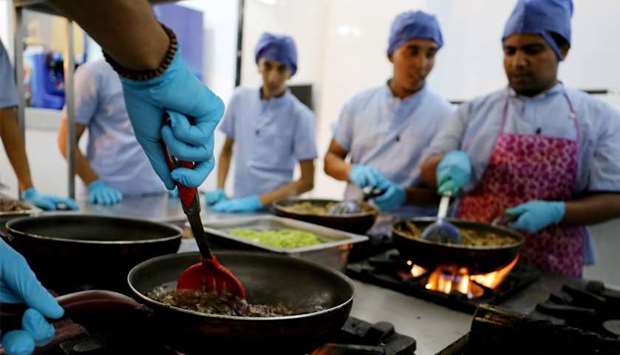A new Egyptian decree meant to combat inflation by forcing food producers to put price tags on their products or face jail time risks increasing pressure on an industry already squeezed by austerity measures, food manufacturers said.
Annual inflation is currently running above 30 percent, putting a tight squeeze on people's spending power, but the government has relatively few options for cracking down on consumer prices.
The new price tag decree, published in the official gazette on Tuesday, stipulates that violations could result in jail sentences of up to five years, fines and confiscations.
‘We don't want to scare the market. This is not an Egyptian invention. All countries try to regulate their markets to protect (citizens) from the greed of some traders,’ said supply ministry spokesman Mamdouh Ramadan. ‘It's not compulsory pricing.’
But manufacturers and economists dismissed the measure as ineffective or simply a misguided attempt by the government to show it was doing something to combat inflation when it was really stripping the market of needed competitiveness and flexibility.
‘This contradicts the mode of operations of many factories and results in complications in the production process,’ said Hani Berzi, the chairman of Edita Food Industries, one of the country's largest food producers.
Berzi listed producing in bulk, different pricing for exports and different locations as well as extra costs for labelling as challenges manufacturers would now have to deal with in their business.
‘We're now working on a proposal to the ministry to ensure the decision doesn't have a negative impact on the investment environment, exports and production and that it doesn't violate pre-set regulations by mother companies,’ said Ashraf El Gazayerli, the chairman of the Chamber of Food Industry (CFI).
Egypt's Chamber of Commerce and the Federation of Egyptian Chambers of Commerce are also working on the proposal, Gazayerli said, adding that he expected a meeting with the supply ministry next week.
‘You cannot place compulsory pricing anyway and think you can implement it,’ said economist and former ministry adviser Ziad Bahaa-Eldin. ‘What kind of message are you sending to investors?’
INTEREST RATE HEADACHE
Part of the problem is that the central bank has hiked official interest rates by 7 percentage points to defend the Egyptian pound after letting it float freely last November in order to secure a $12 billion International Monetary Fund loan aimed at helping get the economy back on track.
The currency has lost half its value since then, which along with the government cutting its fuel and energy subsidies has led to a huge runup in domestic consumer prices.
The interest rate hikes have also slowed down borrowing by local businesses.
Egypt has been trying to encourage investment and promote growth to revive the economy, which has struggled since a 2011 uprising and subsequent unrest that drove tourists and foreign investors out of the country.
The new decree said that violations would include manufacturers and importers failing to put prices on their products and retailers changing the prices of already-labelled products.
‘All food producers, importers, packagers and suppliers of food products must label every product in Arabic and in clear font that cannot be erased,’ it said.
The decree provides the market a grace period until the end of 2017 to sell all unlabelled produce or face penalties.

